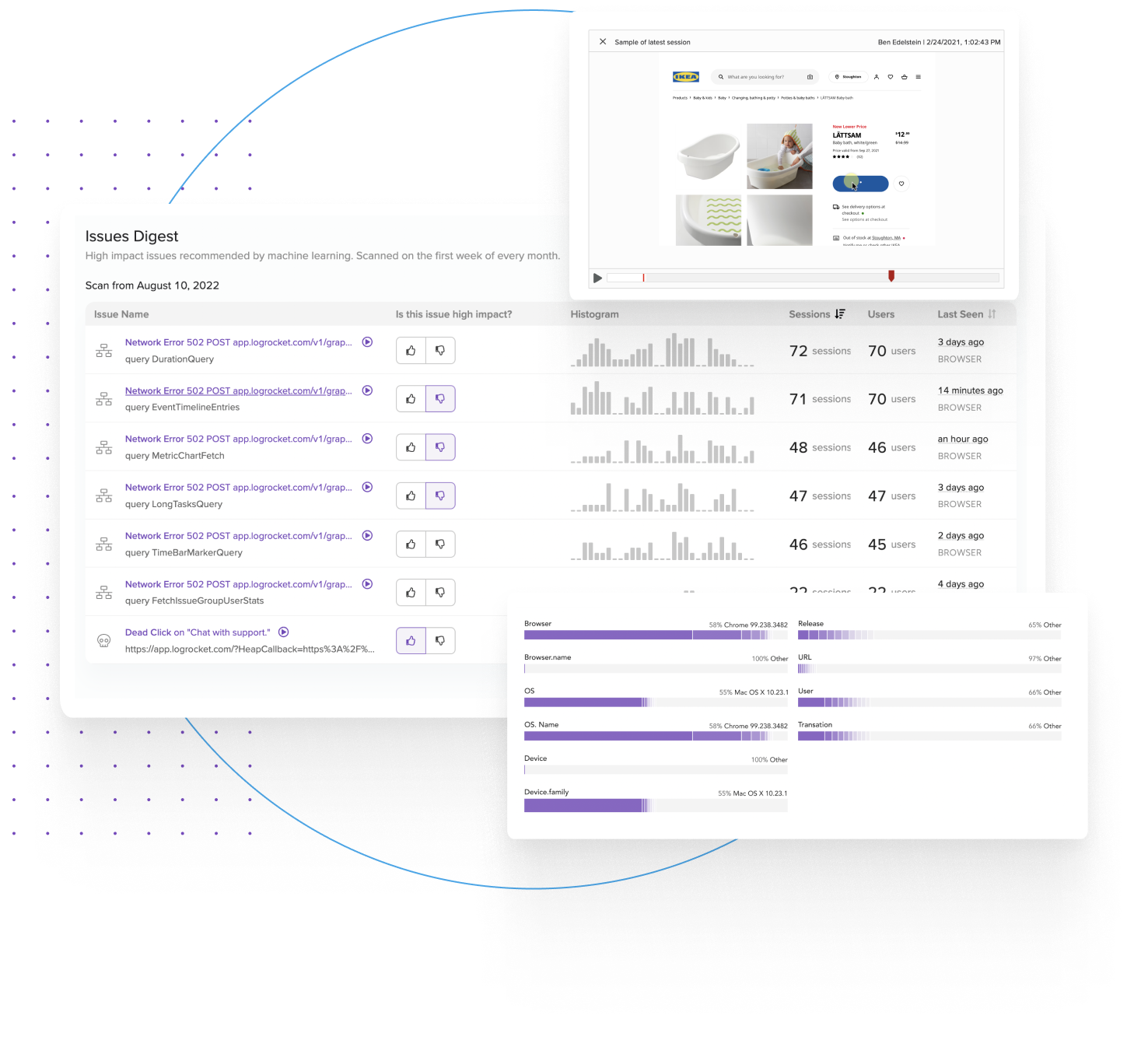When we started LogRocket six years ago, we set out to build the ultimate tool for frontend debugging. When a user reports a problem, LogRocket shows a video replay of exactly what they saw, alongside network and console logs, JavaScript errors, and application state to understand what went wrong. This approach has helped thousands of customers save years of time reproducing, triaging, and resolving issues.
Over time, we’ve realized that it’s not enough to be reactive; the best experiences result from proactively resolving issues — both technical and UX-related — before they’re reported by users. A proactive approach allows you to focus on the most important issues, not just the ones reported by your loudest customers.
Today, with LogRocket Galileo, we’re taking another big step forward in making that proactive approach easier than ever.
What’s wrong?
Digital experiences have become the new battleground where customers and users are won and lost. Digital adoption has increased dramatically over the last few years, and as consumers become more comfortable with the digital world, their expectations for what constitutes a great experience have increased in turn.
Software teams know this. To meet the increased demand, engineering and product leaders have equipped their teams with monitoring, alerting, and analytics tools so that they can design, build, and deliver great software.
Engineering teams have solutions for error monitoring, alerting, triaging and tracking user-submitted tickets, and performance. Product teams have a myriad of dashboards that track business KPIs such as conversion, engagement, adoption, Net Promoter Score (NPS), and customer satisfaction (CSAT).
The problem is that these tools generate so much data that teams often miss the key indicators that are needed for informed decision making.
Error monitoring and alerting tools are mostly noise. They generate hundreds or even thousands of errors per day, yet only a handful are truly important. Attempting to sift through all of these leads to alert fatigue, and teams end up ignoring everything — even the things that matter.
Analytics dashboards can be great for tracking what is happening with key metrics, but fail to provide insight into why those metrics are behaving a certain way. Teams end up taking a “guess-and-check” approach, forming hypotheses and running tests to see which changes make an impact. While this approach can uncover solutions eventually, it’s inefficient and takes away from valuable time that could be spent building new products and features.
LogRocket Galileo cuts through the noise
Today we are excited to introduce LogRocket Galileo — our new machine learning layer and our most ambitious release to date towards solving this problem. Galileo slices through noisy error alerts and crowded analytics dashboards to uncover the most important technical and usability issues affecting your UX.
LogRocket Galileo combines information about how users react to problems with traditional issue and error reporting. Our models leverage user behavior to predict whether identified issues and friction points are important, automating the analytics work that customers already do in LogRocket.
Galileo determines the importance of each issue based on years of user feedback and millions of data points we’ve gathered on what matters most to software teams. Built-in user validation of issue importance ensures that the models continue to learn and become more accurate over time.
Galileo delivers the highest-priority issues directly to you via Slack or email, eliminating the need to search for needles in the data haystack. Each issue is accompanied by session replays showing how it impacts UX, as well as the technical data needed to understand what’s going wrong and what you need to do to fix it.

For example, Galileo would identify a long network request accompanied by a lot of clicks and mouse movement as a sign of frustration and something to investigate, but would understand that a lot of clicks on a datepicker is normal user behavior and something that can be ignored.
Each issue is accompanied by LogRocket’s session replay and detailed technical data so that teams can understand how it impacted the UX and what you need to do to resolve the issue.
Machine learning analytics are the future
Acquiring and retaining customers now requires providing both great products and great experiences. But the current set of digital experience tools are too noisy to deliver the insights you need.
At LogRocket, we envision a world where software teams understand every problem affecting their customers. Gone are the days of guessing or debating what to work on next — LogRocket allows you to prioritize the most important changes in every sprint.
If you’re interested in experiencing Galileo for yourself, you can join the waiting list for the beta here.
If you’d like to become part of the team that’s defining the next generation of solutions for software teams, we’d love to meet you. Galileo is just one step in the process, and we’re hiring.
The post Rethinking error tracking and product analytics appeared first on LogRocket Blog.
from LogRocket Blog https://ift.tt/OBRi8ro
Gain $200 in a week
via Read more



